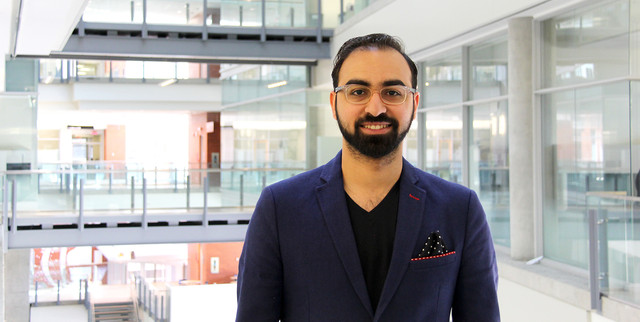A Basis In Science: Modeling Crop Growth in Alberta's Irrigated Districts

Mohamed Ammar, PhD student in Civil and Environmental Engineering, University of Alberta.
How might the growth of different crops be influenced by changes in water demand? Could a specific water policy encourage or discourage the planting of certain crops, because of their water requirements? These questions could be of great importance to policymakers in Alberta’s irrigation districts, so an ALI research team is building a tool that can address them.
The Alberta Land Institute research project Systems Modeling Sustainable Land and Water Policy in Alberta’s Irrigation Sector is constructing a systems model to project potential water demand under a variety of environmental, social, and policy circumstances in Alberta's irrigation districts. This model will be a tool for policymakers seeking to understand possible benefits and challenges of various water management policies, and in order to be useful, it must incorporate sophisticated, accurate, and credible crop growth simulations.
Mohamed Ammar, one of the research team’s leading PhD students, is building a module within the model that specifically meets these needs. Having completed his undergraduate and Masters work at Cairo University, Mohamed is deeply familiar with the importance of irrigation, and is particularly interested in how water policy can influence agriculture in different contexts around the world.
Working closely with Principal Investigator Dr. Evan Davies, Mohamed set about constructing a crop growth module with two specific features: the ability to accurately simulate outcomes for a variety of crops in the Alberta context, and the capacity to extend those simulations over long periods of time.
No existing models combine all of those factors –– they may lack specific crop information, consider crop performance over shorter periods of time (often a single season), or be calibrated for other regions. Those models also might not rely on system dynamics, the method our research team is utilizing to see how simulated changes can feed back on themselves, altering outcomes over time.
Building a module which possesses the necessary features has been intricate work, but from the outset Mohamed identified the key to success: while other models might use empirical approaches, he had to ground his crop yield simulation and soil water balance in science, employing well-proven, physically-based methods to describe these processes.
Just as Master’s student Marie-Ève Jean went into the field to find accurate information about reservoir management in Alberta’s irrigation districts, Mohamed spent months collecting and incorporating real-world data into his module. With this work now nearing completion, he is preparing for one of the most important steps in the construction process: validation.
Last week, Mohamed traveled to Fort Collins, Colorado, to be trained on a model the United States Department of Agriculture has utilized since the early 1990s. Since its first development, the projections from this Root Zone Water Quality Model have been consistently compared to real-world results, enabling numerous tweaks and upgrades to enhance its accuracy. The result has been a powerful and credible tool for simulating crop growth –– one which will serve as an excellent benchmark as Mohamed tests his crop module.
The validation process will continue into the summer, along with work on numerous other components of the systems model. What social pressures might a new water policy create? How could climate change influence demand? The research team must incorporate many factors into the tool before their project wraps up next year.
Once work on the crop module is complete, Mohamed will continue to play a key role in helping integrate all of these factors into the final model. He is confident that the resulting tool will be useful for policymakers in Alberta’s irrigated districts, while also helping provide a foundation for future work on irrigation and water policy in jurisdictions around the world.
Stay tuned to this site for more updates on ALI’s project, Systems Modeling Sustainable Land and Water Policy in Alberta’s Irrigation Sector.